- Home
- Lisa Appignanesi
A Good Woman Page 2
A Good Woman Read online
Page 2
There was a horse, too, a broad-backed brown mare, who trod lazily and reluctantly round a field when we perched ourselves on her. She must have been at the origin of the name Robinson gave me. ‘Mare’ I was and ‘mare’ I would remain for the length of those summers.
Sometimes two friends of Robinson’s would cycle over from a neighbouring farm. Two boys a little older than he was. When they came Robinson would instantly abandon me, pretend I didn’t exist. I don’t know whether I imagined the sheepish look on his face then. In any event, I was left to my own devices, to weave daisy chains or preferably invent complicated structures out of bits of twig and stone in the woods. Traps again. All the while I would fantasize intricate plots in which the boys ended up helpless in deep snake-filled pits, or drowning, and it was up to me to save them if I so chose. I always let the other two boys rot or drown, slowly, painfully, and just in the nick of time rescued an eternally grateful Robinson.
When the other boys had left, Robinson would come looking for me. I would pretend not to notice him and carry on with my game while he shuffled his feet or grunted and made himself increasingly obvious. Then I would say I was perfectly happy on my own and didn’t want to play with anyone. He would go away and come back with ever more enticing proposals, begging really, until eventually I would disdainfully agree to play with him. By the end of the summer, I was allowed to join in the boys’ games. But sometimes Robinson left me out again just, I think, so that we could reenact our little ritualized power plays.
I had never known life could be so free of adults. We saw Stephanie at mealtimes and fed the chickens with her or picked berries. Once a week, we would all pack into the Morris Minor and go to town with her for a shopping expedition. On occasion, too, we would help Chris and the other men with odd tasks. But that apart, the world was our own.
Childhood. The formative years they’re called. They would better be known as the re-formative years. We reform them all the time.
-4-
Chris was Robinson’s father. He was a burly man with a ruddy face and huge hands which always had grit around the nails. He didn’t speak much except to ask us at dinner what we had got up to that day or ask us at breakfast what our plans were. What I remember best about him were his hands. He would tussle my hair with one by way of greeting or lift me up onto the mare’s back as if I were no heavier than a daisy chain. I remember his smell too. He smelled of hay and wind, sweet and salty all at the same time.
He was the first father I had any experience of. At home in Paris I didn’t have a father. Oh, I had had one once, my mother had told me that, but I had no memory of him and since I had no memory, I think I felt no particular absence. After that summer in England, I became aware of the lack.
My mother, in her customary white blouse and neat blue skirt, had come to fetch me from the farm and though I was painfully aware of the critical eye she cast over the establishment, she seemed genuinely charmed by Stephanie and Chris. This first parting was a tearful one. Robinson even gave me four of his best marbles to take home - amongst them a big glossy blue and a cat’s eye which changed colours as it rolled. It was arranged that I would come back the following summer, this time with my own dungarees.
On the eve of my first day back at school I confronted my mother. We were in my room with its narrow bed and small desk and its single picture of George Sand’s native village of Nohant. My mother was putting out my school clothes, arranging my notebooks in my leather satchel, when I asked her.
‘What happened to my father?’
She looked at me quietly for a moment, nothing moving in her face, only a little flicker at the corner of her lips. Then she urged me into the kitchen. She boiled some milk, asked me if I’d like some honey in it, and poured the concoction into one of those huge breakfast bowls. Only when she had sat down did she look me in the eyes.
‘Your father left us,’ she said. She smiled, but it didn’t come out quite right and I could tell by the way she was moving things round on the table, arranging the sugar bowl, folding a napkin, that that wasn’t the whole story.
‘You mean he died,’ I leapt in. I suspected she thought I didn’t know about death. Grown-ups always made such a fuss and a hush hush about it that perhaps she was afraid to tell me. But in England I had seen plenty of mice dead in the fields, seen Small paw them and roll them about, their grey corpses all listless and somehow shrunken.
‘No, he’s not dead.’ She paused. ‘He simply left us, when you were about two.’
‘You mean he was a bad man,’ I said. I couldn’t imagine Chris leaving Robinson and Stephanie.
‘No, he wasn’t a bad man. He was a good man.’ Her hands were clenched in front of her and I knew that she didn’t want to go on talking. But I knew that she would. My mother was always fair.
‘Why did he leave us?’ I persisted. ‘Did he hate us?’
‘No, he loved us, loved us very much. Particularly you.’ She tried that smile again, but this time it came out even worse.
‘So why did he go?’
‘He felt he had to. And he was right.’
I didn’t believe she believed that last. ‘Did you want him to go?’
‘Yes.’ Her voice cracked a little as she said it, so she repeated it again more firmly.
‘Where did he go?’
‘He went East.’
That was so vague I couldn’t think what she meant, but my next question was all important, so I rushed on.
‘Will he come back and see us?’
She stroked my hair then. It was an act that was reserved for when I was ill and I knew what she would say before she said it. ‘I don’t think so. It’s far away.’ I must have looked tearful, for she quickly added, ‘When you’re a little older, I’ll try and explain it to you better.’
I don’t know why I remember that first scene more clearly than all the others, but I do. To give my mother credit, she did try and explain it all to me again and again over the years whenever I asked. Gradually I learned that my father was a doctor, that he had been a member of the resistance during the war, that he had felt propelled to carry on doing good, useful things, that he had been asked by people he knew to go to Vietnam - where he had been brought up - to work at the Hôpital Grall, the French hospital, that she hadn’t felt able to go with him, that it would have been too dangerous for me. In any case, her life was here, in Paris. But he had needed to go, so they separated. And he had been right to go, she always claimed, and always with tightly pursed lips.
She started to tell me stories about him, little things, about how he loved sailing and had once had a boat, how he loathed cabbage but would eat it anyway with a slight frown on his face, how he was very efficient at changing nappies; and bigger things, how he had been decorated for his war work, what a fine doctor he was, how he had taken up a speciality in burns and skin grafting.
The trouble was that the more fine things she told me about him, the less I believed her and the more I started to despise him. It seemed to me that he had done something unpardonable, that each of her stories was a little act of cover-up and forgiving. I suspected that deep inside her she too considered him unpardonable and resented him with a barely controllable passion. You only had to see how her lips and eyes didn’t match when she talked about him to realize that.
When I grew older and started to criticize him, she would defend him adamantly. Whatever I said, she was always on his side, like some high-powered attorney well paid to perform a whitewash. I secretly admired her for her implacability, but I was after something else. I think I was after the truth.
Having learned the word divorce, I used it on her and asked her quite casually one night whether she had one and was planning to remarry. We were doing the dishes, she drying, I washing, and I can still see how a glass hurtled out of her hands and smashed into a hundred pieces on the tile floor. Her face when I dared to look at it was frozen. It was only when she was bent over with pan and brush, sweeping up splinters, that she answered
me in a voice which was calm, if to my ears strained. She was too old to remarry now, she said.
In retrospect, I suspect she always hoped my father would return. She had met him when no longer in her first youth and the six or so years they had spent together had obviously marked her for life. At the time when I began my interrogations, she must have been in her late thirties, still a slender, pretty women with thick hair which she always wore neatly coiled back. She used to let me brush it sometimes and I would wonder at the single white streak which started at her brow and worked its way dramatically through that sleek darkness.
I don’t know whether she had any letters from my father in those years. If she did, she never told me of any. But I do remember that she would read all the news about Vietnam assiduously, perhaps in the hope of seeing his name. And during the long stretch of the war, she belonged to innumerable committees - medical aid committees, relief committees, peace in Vietnam committees..
She remained a one-man woman. Quite unlike her daughter. And whether out of love or hate, I’m still not sure.
-5-
From my base at the Intercontinental, I explore the city. I talk to no one but waiters and hotel receptionists. Each day I set out on foot and head for a different arrondissement. Sometimes, if my destination is too distant, I pop into the metro and emerge from its cocoon to wander haphazardly through streets without venturing into museums or galleries. I have no plan except that which numbers the districts. I simply gaze at facades, lose myself in markets, or sit in cafes watching the endless spectacle of the streets.
On my first day I climbed to the top of the Eiffel Tower and spent hours trying to work out where each borough began and ended. Then I started making my way through the left bank, beginning with a Paris I didn’t even know existed, past the Quai de Grenelle to a new city like a Chicago in better taste with modern structures of glass and steel, television and computers companies, a flat expanse of park composed of fountains and secret gardens, each on a theme, each with its own rectangular glass conservatory. Saturday, I headed into the Seventh, those long, bland, elegant streets behind the National Assembly. Life here is all hidden, lived within immaculate walls. One only glimpses it when heavy gates open to reveal sumptuous courtyards or one stumbles onto the Boulevard St Germain.
But I am not ready for the more familiar precincts of the Sixth yet. I change course and concentrate on the west of the city, wander up the Champs Elysées, veer north to find myself at the flower stalls of the Place de Ternes and then in the Parc Monceau. I sit on a bench and watch the leafless trees, listen to the children calling out to soberly dressed nannies.
It is only gradually and with a slight shiver of apprehension that I consider venturing towards streets that I have known better. Like a reluctant bird of prey I am circling round the sites of memory before daring to pounce.
On my fifth day I decide for some obscure reason to have breakfast in the hotel dining room. No sooner have I placed myself at a table that looks out on the glazed courtyard, than a voice calls out to me closely followed by its fur-swathed owner.
‘Maria Regnier, well I never. Can we join you?’
Before I can answer Sarah Martin manoeuvres her ample form into the chair in front of me and waves a decidedly uncomfortable youth into the one at her side. ‘How brilliant to bump into you here,’ Sarah enthuses and before I have had a chance to say more than, ‘Hello,’ she has placed her order for a continental breakfast with coffee plus a plate of two eggs sunny side up with bacon, very crisp, please, for the youth she beamingly and simultaneously introduces as her son, ‘William’.
William squirms, while Sarah talks. And talks. Sarah has always talked unstoppably since I have known her, which is for three or four years now. She even talks while she is eating. Given that she is a food writer, this is perhaps remarkable, though it has to be said that while chewing, her talk is usually about the ingredients in her mouth. Be that as it may, Sarah is a fine writer and her column in New York Magazine can make or break a restaurant’s reputation faster than I can scuttle up to my room, which is what I would like to do right now. I don’t, of course. I sit and listen while Sarah tells me about everything she and William have done and eaten in the last few days.
I met Sarah when her publishers asked my agency to do the public relations on her first book. Have I mentioned yet that in the United States of Advertising, I am a PR agent? Nichols, Regnier and Peele Associates. Yes, even the firm bears my name, if second in line. I’m a partner or was until I left. I am an expert in that elegant straining of the truth which is known as hype. I create events or images for people or corporations who need creating. I do this so that the media can be seduced into making the right news of them. Hey presto! demand is fostered or disseminated.
With Sarah it wasn’t difficult. She was already more than half way there. All I did was dream up a little party for her to which the passing and gossiping great could be invited. We asked three of her favourite chefs to concoct dishes named for her. They were more than pleased to comply. A newly slimmed and theatrically coifed Sarah guessed ingredients and chefs blindfold - to great rounds of applause. And the event and book were off and running in countless columns. Since Sarah is a great little chatterer, the chat shows were not far behind. The book sold extremely well.
I am not cynical about any of this. It is simply that these days I am a little worn. Nor can I muster the necessary hyperboles to greet Sarah’s announcement that she is in Paris doing research for her newest project - a book, complete with a check-list of sumptuous recipes, about the best of Paris restaurants at moderate prices.
‘You will join us tonight, won’t you Maria? We’re going to this little place just by Notre Dame. La Petite Table, it’s called. Meant to be terrific. We’d love Maria to come with us, wouldn’t we William?’
William looks up at me with a decidedly suspicious glance before turning his gaze back to his plate and muttering something that sounds like confirmation.
I plead a previous appointment, then look at my watch and leap up before Sarah can issue any further invitations.
‘I’ve got to go. Sorry, darling,’ I lie.
‘Tomorrow evening, then?’ Sarah takes me at face value and when I fidget her face lights up. ‘Oh, I see, another one already.’ Her expression wrestles between bitchiness and compassion and settles for the latter. ‘It’s the best thing for you, I’m sure,’ she says. I can hear her thinking that for all my sins, I’m valuable. I’m good at my job, the best some think and I might be useful at some future date. Then too, I know a great many people. Sarah gives me a consoling look.
I wave goodbye hurriedly. I cannot bear these people feeling they can feel sorry for me.
Back in my room, I throw my things into my cases and ring the number Steve has given me. I break into a sweat as I wait for someone to answer. When I hear a voice, I am so relieved that I have to sit down on the bed.
-6-
The apartment is on the Rue d’Oudinot, a short unremarkable street in the seventh arrondissement. But the space itself on the fifth floor is remarkable. One long room painted in some pale ochre tint makes up most of it. The right wall is punctuated by five sash windows which look out on an exquisite courtyard garden, complete with lawn, a tree I can’t name until its tracery takes on leaf, and an oval fountain. Tapestry covered chairs are arranged so as to give the room an assortment of small enclaves. The central one is marked by a fireplace. Above it on either side fly two plump gilded angels bearing candelabra. One end of the room gives onto a separate small but well-appointed kitchen. At the other, a polished ladder leads up to a mezzanine with a desk and divan. Finally, at the far end of the apartment, there is a bedroom in which stands a delicate four-poster bed.
I am enchanted. Steve and Chuck have found an assortment of pictures and objects which surprise and hold the gaze. There is a finely filigreed cornice from some gothic edifice. A doric half column stands by one of the windows. Above the mantel, there is a small exquisi
tely painted oil which shows only a woman’s calves and feet, leather sandalled, walking gracefully but firmly over some site that can only be antique.
I want to scan the shelves of books, but my eyes return of their own will to those lightly shod feet. Where can she be going? I curl into one of those arched chairs and sit staring at her until the waning of the light startles me from my reverie. I have no idea where the day has gone, but I feel strangely at peace. I see no need ever to venture from this room again.
Three days later, however, I do. I feel bold. I know exactly where I am going. It is what I have avoided ever since I arrived.
The air is crisp and clear. I walk quickly along the Seine, past Notre Dame and cross at the Pont de la Tournelle onto the Ile St Louis. I stop neither to look at the miracle of the flying buttresses, nor to browse in the little shops which have flowered on the island. I am afraid that if I pause I will lose my nerve. Hastily I make my way across the Pont Marie, along the Quai des Celestins and into the Rue Saint Paul.
Now that I am here, I take a deep breath. This is the square mile of my childhood. This is where I was born. It is the bridge I have just crossed which gave me my name. My mother used to walk over it daily and loved the serenity of its stone, the arches of irregular size, the bouquets of lime. No Virgin Mary is my namesake, but Henri IV’s chief builder of bridges, one Christophe Marie. Marie’s planned bridge took a long time to come to fruition though. The first stone wasn’t laid until Henri had met his assassin and another Marie, this time the stubbornly enterprising Marie de Medicis, Henri IV’s wife and designated Regent, my second namesake, had begun to grapple with the building blocks of Paris. And even then, it took another twenty-six years of chequered history to complete. Perhaps I should take courage from my bridge, so slow to reach its destination, but unwavering for the centuries since.

 Memory and Desire
Memory and Desire The Dead of Winter
The Dead of Winter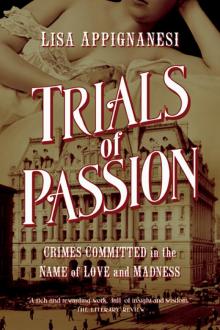 Trials of Passion
Trials of Passion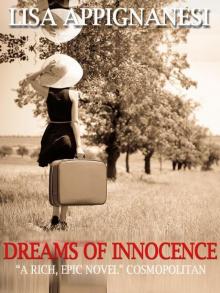 Dreams of Innocence
Dreams of Innocence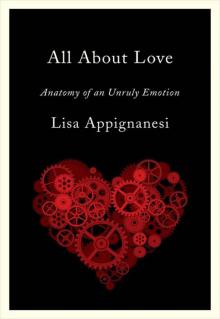 All About Love: Anatomy of an Unruly Emotion
All About Love: Anatomy of an Unruly Emotion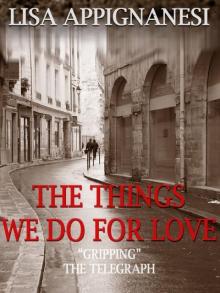 The Things We Do For Love
The Things We Do For Love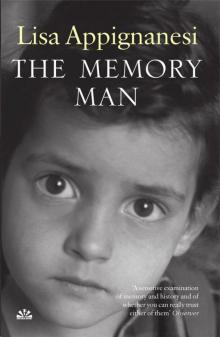 The Memory Man
The Memory Man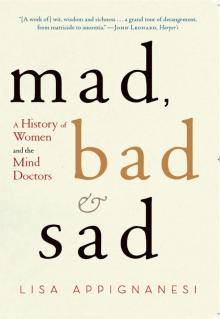 Mad, Bad, and Sad: A History of Women and the Mind Doctors
Mad, Bad, and Sad: A History of Women and the Mind Doctors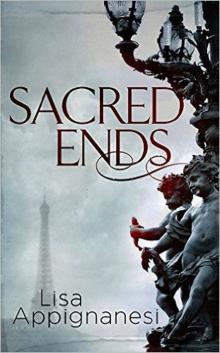 Sacred Ends
Sacred Ends Paris Requiem
Paris Requiem Sanctuary
Sanctuary A Good Woman
A Good Woman